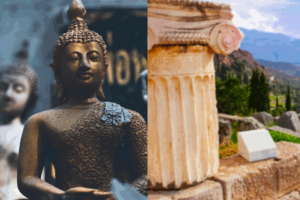We all know someone who is addicted to chasing the dollar. Their entire focus becomes the accumulation of wealth and assets, often at the expense of their health and relationships. Is it really worth it? Our modern society encourages chasing material wealth. Heck, our western societies are founded on materialism, and the masses seem hypnotized by wealthy entertainers and athletes. I find myself often shaking my head in distaste. Western culture pushes materialism on all of us, and it won’t stop because it is a successful business tactic. Did the early sages of Stoic philosophy have anything to say about this? You bet they did! Ancient Rome had its share of materialism and wealth chasers, too. This provides the modern reader with very applicable insight on how to view the concept of greed from a Stoics perspective.
I’ve broken this down into two parts: first, we’ll consider whether materialism is good or bad, and then we’ll consider how to approach it and what we can do to avoid becoming too enmeshed in a materialistic way of life where we place a premium on money and material possessions over things like our values, relationships, and well-being.
The first one is, well, the first. Materialism: Is it good or bad? The ancient Stoic philosophers had varying opinions about materialism and how to deal with it. Some would argue that we should refrain from leading soft, extravagant lives. Others would argue that prosperity is acceptable as long as it was done without causing harm to others. Likewise, as long as you didn’t become obsessed with them, it was perfectly fine to enjoy the benefits of your achievements. In essence, they all believed that materialism and riches were neither good nor bad. Possessions can be nice and expensive without being good or bad. Being prosperous is fine as long as it wasn’t obtained through deception or hurting others. The categorization of these benefits as good or bad depends on how we view and utilize them.
The issue arises when financial prosperity ceases to be a by-product of our labor and instead becomes the ultimate goal of our efforts. At that point, it runs the risk of turning from being neutral to being adverse. Money and riches have the potential to lead people to compromise their morals, their principles, and their integrity in the quest, and that’s also one of the reasons why, if we’re not mindful of it, they can easily change from being neutral to being negative.
The ancient Stoics cautioned against becoming overly attached to worldly belongings since they are ultimately beyond our control. Our riches and belongs are never truly ours. Do we take them with us when we die? Furthermore, when we place our mental and physical well-being in circumstances over which we have no control, they become vulnerable to chance. The Stoics viewpoint advocates a balanced approach to money and possessions as a general way of life. They believed that while it has no real value to force yourself to live in extreme poverty, it is unlikely that having much more will make you happier. Instead, the search will likely result in a life of dissatisfaction with what we have and a constant pursuit of what we don’t.
How often have you known of someone who has a great deal of wealth but is miserable? Many successful people chase more and more riches and never achieve any peace or balance in their lives. Often, people turn to drugs to fill the void. Likewise, how many people without much spend great amounts of their time worrying about gaining more? Never finding satisfaction in what they have. Their thoughts consume them, and their circumstances make them feel like something less. One of the keys to becoming stoic is finding balance and rationalizing that wealth or poverty doesn’t make you a better person. Having balance, peace, and a positive mindset is what does.









Most Commented Posts